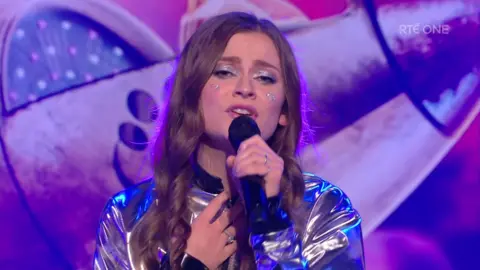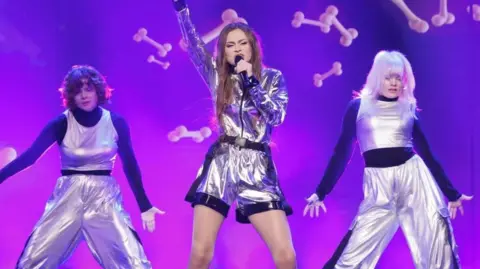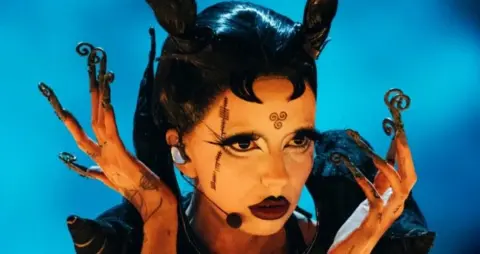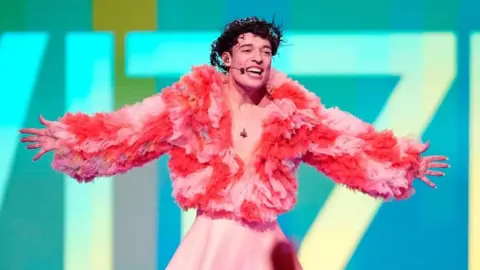EMMY to represent Ireland at Eurovision
 RTÉ
RTÉEMMY has been selected to represent Ireland in the 2025 Eurovision Song Contest in Basel, Switzerland.
The 24-year-old singer, who was born in Norway, will perform her song Laika Party.
Six competitors performed on a special Eurosong edition of RTÉ's The Late Late Show on Friday evening.
The winner was chosen by the combined votes of the public phone vote, an international jury and a national jury.
EMMY began writing her own songs at the age of seven and her career began in 2015 when, as a 15-year-old, she participated in Melodi Grand Prix Junior, one of the biggest music competitions in her country, for children.
Speaking after her performance, she said she was shocked and that she hopes to make Ireland proud, before thanking the voters.
The Eurovision Semi-Finals will take place on 13 May and15 May, with the Grand Final taking place on 17 May.
 RTÉ
RTÉThe other performers vying for place on the Eurovision stage in Switzerland on Friday were:
- Bobbi Arlo performing Powerplay
- Reylta performing Fire
- Adgy performing Run into the Night
- EMMY performing (Laika Party)
- Samantha Mumba performing My Way
- NIYL performing Growth
On Friday, The Late Late Show host Patrick Kielty was joined by a panel of experts including former Irish entries Bambie Thug and 2008 contestant Donal Skehan.
They were also joined by RTÉ 2FM's Laura Fox and Dancing with the Stars judge Arthur Gourounlian.
Last year, Bambie Thug became the first Irish entry to qualify for a Eurovision Grand Final since 2018.
They finished in sixth place, scoring Ireland's best placement in the contest since 2000.
But the Cork singer's participation was not without it's controversy.
The contest was overshadowed by protests over Israel's participation, due to the humanitarian cost of its war on Hamas.
 Sarah Louise Bennett / EBU
Sarah Louise Bennett / EBUMore than 400 Irish artists signed an open letter urging Bambie to boycott the competition after calls for a ceasefire in Gaza were mounting from a number artists.
But Bambie maintained that pro-Palestinian representation at Eurovision was important.
During a dress rehearsal for the semi-final, they were told to remove pro-Palestinian symbols from their face.
Their costume had originally included an ancient Celtic writing known as Ogham - which they said had spelt "ceasefire" and "freedom for Palestine".
After the final, Bambie, who had been outspoken in their views, accused Israel's national broadcaster, Kan, of "inciting violence" against them during its coverage.
Other participants accused the Israeli delegation of filming them and posting clips online without their permission.
The EBU acknowledged that several contestants had lodged complaints.
"We spoke to a number of delegations during the event regarding various issues that were brought to our attention," the EBU said.
"The EBU's governing bodies will, together with the heads of delegations, review the events surrounding the ESC in Malmö to move forward in a positive way and to ensure the values of the event are respected by everyone."
 Getty Images
Getty ImagesLast year, Nemo took home the trophy for Switzerland in 2024 with their song The Code.
The singer became the first non-binary artist to win Eurovision.
Fittingly, they wrote the song to explain how they came to terms with their identity.
Nemo later told BBC News the song contest's organisers didn't do enough to support participants amid the tension.
"I really hope they have things in place for the next year to make sure that part of the whole contest, especially mentally, gets taken care of.
"Because I did feel alone and I know that some other artists were also feeling that way."
The EBU said it had introduced changes that would provide "more clarity and protection" for artists at this year's competition.
